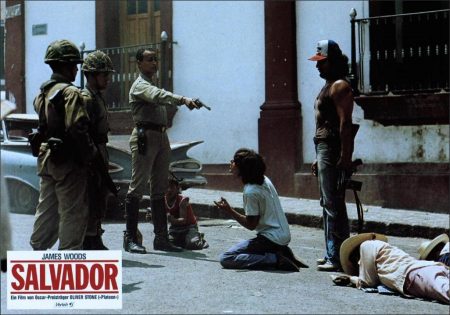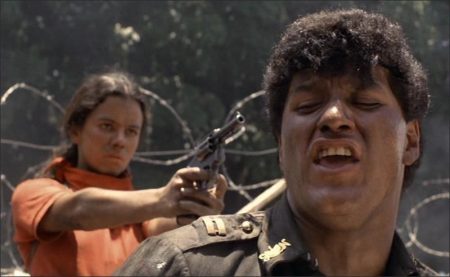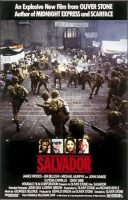Salvador movie storyline. A journalist, down on his luck in the US, drives to El Salvador to chronicle the events of the 1980 military dictatorship, including the assasination of Archbishop Oscar Romero. He forms an uneasy alliance with both guerillas in the countryside who want him to get pictures out to the US press, and the right-wing military, who want him to bring them photographs of the rebels. Meanwhile he has to find a way of protecting his Salvadorean girlfriend and getting her out of the country.
Salvador is a 1986 American war drama film co-written and directed by Oliver Stone. It stars James Woods as Richard Boyle, alongside Jim Belushi, Michael Murphy and Elpidia Carrillo, with John Savage and Cynthia Gibb in supporting roles. Stone co-wrote the screenplay with Boyle.
The film portrays in a realistic light the left-wing revolutionaries and is strongly critical of the US-supported military which armed and funded the brutal repressive right-wing regimes, focusing on the murder of four American churchwomen, including Jean Donovan, and the assassination of Archbishop Óscar Romero by death squads. The film was nominated for two Academy Awards: Best Actor in a Leading Role (Woods) and Best Writing, Screenplay Written Directly for the Screen (Stone and Boyle).
Film Review for Salvador
Given the headlines, you might think “Salvador” would be a controversial movie about the United States’ role in Central America. But it’s actually a throwback to a different kind of picture, to the Hunter S. Thompson story Where the Buffalo Roam, where hard-living journalists hit the road in a showdown between a scoop and an overdose.
The movie has an undercurrent of seriousness, and it is not happy about the chaos that we are helping to subsidize. But basically it’s a character study – a portrait of a couple of burned-out free-lancers trying to keep their heads above water.
“Salvador” stars James Woods, that master of nervous paranoia, as a foreign correspondent who has hit bottom. He’s drinking, drugging and unemployed, living off past glories. When all hell breaks loose in Central America, he figures it’s a good story since he still has some contacts down there. So he enlists his best friend, a spaced-out disc jockey (James Belushi), and they load up with beer and drive their jalopy through Mexico to where the action is.
The heart of the movie is in their relationship, and I kept being reminded of another Thompson saga, Fear and Loathing in Las Vegas, where the journalist and his lawyer drove their car through a desert where drug-induced dragons seemed to swoop at them out of the sky.
“Salvador” is a movie about real events as seen through the eyes of characters who have set themselves adrift from reality. That’s what makes it so interesting.
Once they’re at their destination, Woods and Belushi start looking up Woods’ contacts, who include a neo-fascist general, several bartenders and an old girlfriend. Woods makes a stab at being a correspondent – he’s always on the phone to New York trying to get credentials from a reputable news-gathering agency – while Belushi settles into the local routine of bars and loose women.
A plot of sorts emerges, along with the usual characters we expect in a story like this: the American generals and embassy spokesmen and CIA types. Woods and Belushi hurry off recklessly in all directions, keep finding themselves surrounded by the wrong people and escape with their lives only because Woods is such a con artist.
And he is. This is the sort of role Woods was born to play, with his glibness, his wary eyes and the endless cigarettes. There is an utter cynicism just beneath the surface of his character, the cynicism of a journalist who has traveled so far, seen so much and used so many chemicals that every story is just a new version of how everybody gets screwed.
That’s why there is a special interest in the love affair between Woods and Maria (Elpedia Carrillo). She is a local woman he truly loves, but she lives by a code of Catholicism and respectability – a code that seems constantly in danger of being overwhelmed by events.
The central scene in the movie is possibly the one where Woods goes to confession. He has decided to marry the woman in order to get her out of the country. She insists on a church wedding. And so we get an extraordinary closeup of Woods’ face as he talks with the priest and tries to make some sort of a bargain between Catholic requirements and his total ignorance of conventional morality.
Meanwhile, we meet some of the other people on the scene, including John Savage as a great war photographer and Michael Murphy as the U.S. ambassador, a tortured liberal who speaks of peace and freedom while the CIA goes about its usual business right under his nose.
The subplot involving the Savage character is not very successful. I can see what they’re doing, trying to set him up as a dedicated photojournalist who will risk his life for a great picture. But when he finally does come to his personal turning point, it’s for a photo even the audience knows isn’t great: a shot of an airplane swooping out of the sky. Without context, it could be any airplane, flying out of any sky.
“Salvador” is long and disjointed and tries to tell too many stories. A scene where Woods debates policy with the U.S. officials sounds tacked on, as if the director and co-writer, Oliver Stone, was afraid of not making his point. But the heart of the movie is fascinating. And the heart consists of Woods and Belushi, two losers set adrift in a world they never made, trying to play games by everybody else’s rules.
Salvador (1986)
Directed by: Oliver Stone
Starring: James Woods, Jim Belushi, Michael Murphy, John Savage, Elpidia Carrillo, Cindy Gibb, Will MacMillan, Valerie Wildman, José Carlos Ruiz, Jorge Luke, Juan Fernández, Rosario Zúñiga
Screenplay by: Oliver Stone, Richard Boyle
Production Design by: Bruno Rubeo
Cinematography by: Kathryn Morrison
Film Editing by: Claire Simpson
Makeup Department: Bertha Chiu
Music by: Georges Delerue
MPAA Rating: R for adult situations, language, nudity, violence.
Distributed by: Hemdale Film Corporation
Release Date: March 5, 1986
Views: 241


